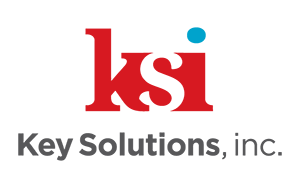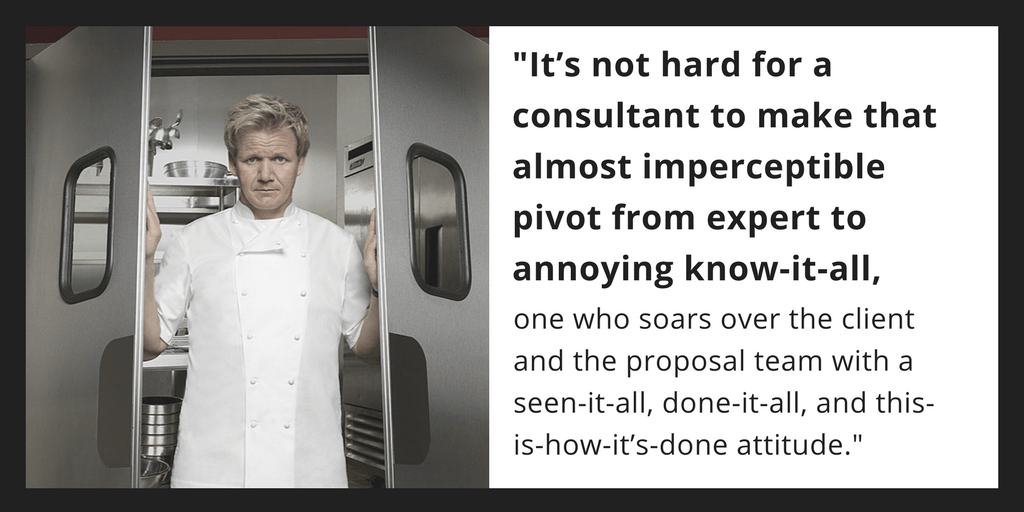A benefit of being proposal consultants is the variety of our experience on a range of proposal types, teams, and companies. It makes us useful and valuable, but it can also work against us.
It’s not hard for a consultant to make that almost imperceptible pivot from seasoned expert to annoying know-it-all, one who soars over the client and the proposal team with a seen-it-all, done-it-all, and this-is-how-it’s-done attitude.
They are the Chef Ramsays of the proposal world. No one doubts their brilliance, but working with them can get extremely uncomfortable, creating a kind of proposal shop Hell’s Kitchen. Know-it-alls usually wave off dissent. They don’t converse, they lecture. They tend to be my-way-is-the-right-way narcissists.
As a fellow consultant, I cringe when an obnoxious know-it-all whacks another proposal team member over the head with his expertise.
I’ve watched a know-it-all at a strategy session rolling his eyes as engineers eked out a solution. His criticism began with this brickbat, “You guys don’t have a clue as to what the government is asking for here ….” So even if his critique was valid (and, in this case, it was), the engineers were defensive and less receptive. Not helpful.
Apparently, some proposal consultants haven’t read the “Know-It-Alls Guide to Working Well with Others.” (Just did a Google and Amazon check, no such book exists, yet.) Know-it-alls often are blind to their own condition—no one thinks they’re a know-it-all. The irony is know-it-alls have a wealth of knowledge that their team members are too intimidated to access. What a waste.
We often see articles on how to deal with annoying workplace know-it-alls. So, here are five tips to keep from becoming one:
1. Maintain your sense of humor, but ease up on the sarcasm.

Maintain your sense of humor, but ease up on the sarcasm.Proposal work would be a lot more fun if not for deadlines. The hectic cycles of content development, review, and revision can be intense, especially as the delivery date approaches. Humor is a release valve for some of that intensity.
2. Listen more than you speak.

Don’t be so quick to dismiss ideas that, to you, might seem obviously wrong. When co-workers feel uneasy about venturing their opinions or ideas, it hinders the group’s flow and weakens its effectiveness.
3. Ask more questions

There’s usually a reason behind a company’s processes, whether it’s good or bad. Try to see things from their point of view. Start by asking, “Help me understand where you’re coming from?” If you want to sway them to your side, remember that people generally take steps, not leaps.
4. Be humble and empathetic

These are soft values in the proposal world, but important ones. So much of our success depends on how well we meld as a proposal team. Some proposal shops can start to look like Hell’s Kitchen in the last weeks of a proposal deadline, so teamwork is essential for maintaining cool heads, coordinating well, and getting the proposal out.
5.Pick your battles, but suggest don’t demand.

In the proposal world, there often is no one right way. The two priorities of proposal content that count most are compliance (Have you answered all the government’s questions?) and responsiveness (How well have you answered all the government’s questions?). If you see room for improvement, gently suggest changes and present your reasons and their benefits.
Final Thoughts:
It takes a measure of humility and patience to work effectively as part of any team. In many cases, proposal teams are assembled for specific proposals within a company. Team members usually have subject-specific knowledge, but are new to the process of developing a proposal. Often, team members are pulled from their jobs on similar contracts to help with a proposal (while their inbox piles up). The last thing they need is a proposal consultant know-it-all who is quick to point out their inexperience.
We are valued in the proposal industry for our insight, knowledge, and experience, but only to the extent we can leverage them to help guide proposal teams from content development to final delivery, or help them fine-tune their solutions, or help streamline their processes.
featured image photo credit: Flickr



Hello, I’m with Communications Concepts, Inc. in Cape Canaveral, FL. How would we go about getting permission to reprint this article in our company Proposal Consultant newsletter?
Hello, our Communications Director, Valeria Quinonez will send you an email. Thanks for your interest in reprinting the article!